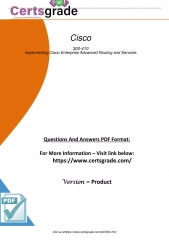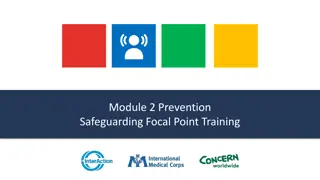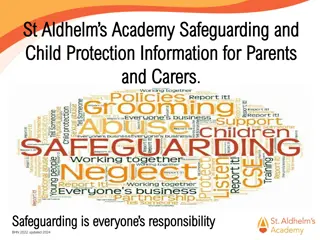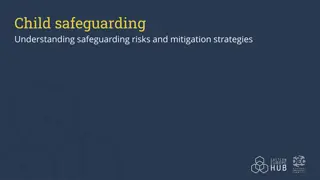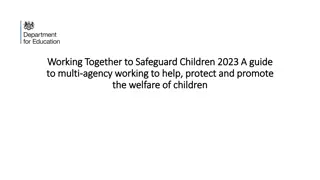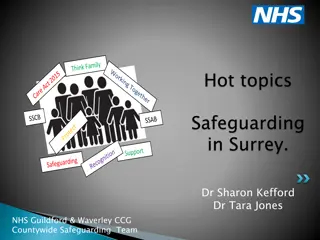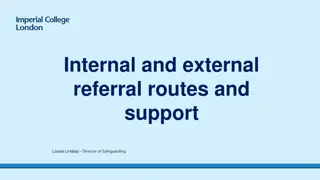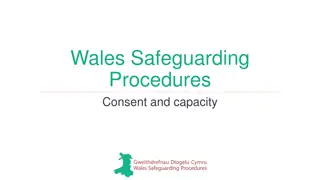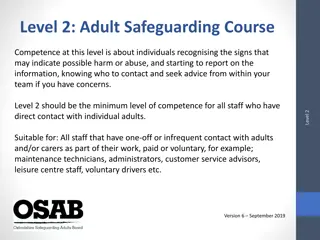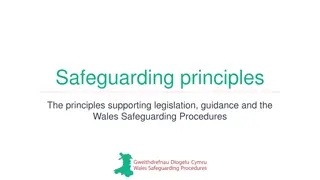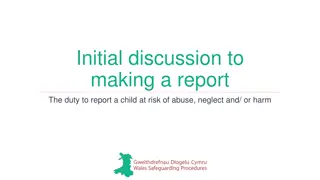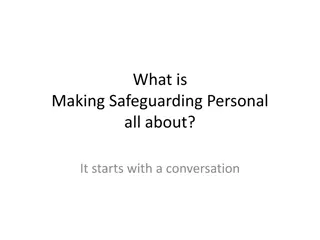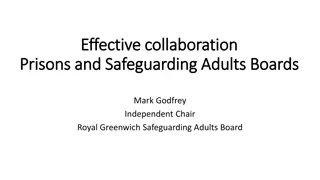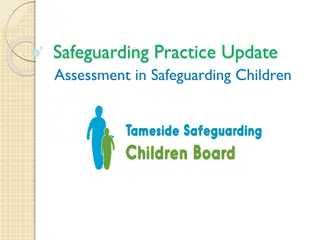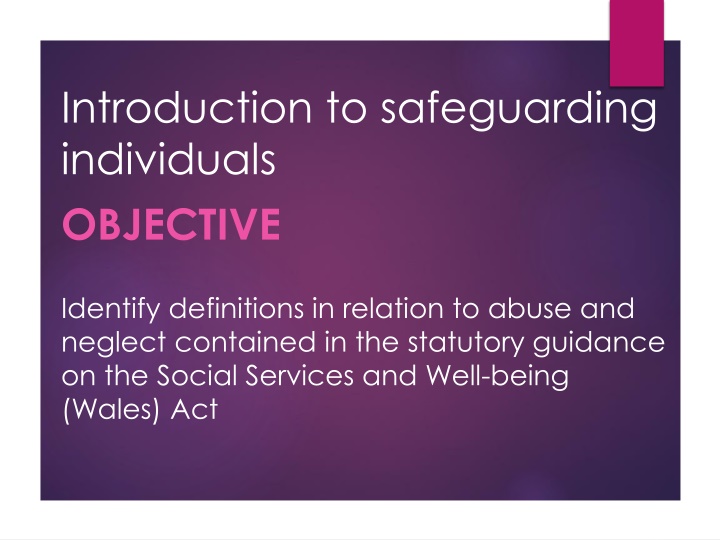
Safeguarding Individuals: Definitions, Principles, and Protection
Explore definitions related to abuse and neglect, understand the roles defined by the Social Services and Well-being Act in Wales, and discover the principles of safeguarding individuals. Learn about adult and child definitions, carer qualifications, the concept of disabled individuals, and the importance of safeguarding against abuse and neglect. Understand the link between safeguarding and promoting well-being, encompassing physical and mental health, protection, education, relationships, societal contribution, rights, economic well-being, and housing. Define an adult at risk and comprehend the criteria for identifying at-risk adults.
Download Presentation

Please find below an Image/Link to download the presentation.
The content on the website is provided AS IS for your information and personal use only. It may not be sold, licensed, or shared on other websites without obtaining consent from the author. If you encounter any issues during the download, it is possible that the publisher has removed the file from their server.
You are allowed to download the files provided on this website for personal or commercial use, subject to the condition that they are used lawfully. All files are the property of their respective owners.
The content on the website is provided AS IS for your information and personal use only. It may not be sold, licensed, or shared on other websites without obtaining consent from the author.
E N D
Presentation Transcript
Introduction to safeguarding individuals OBJECTIVE Identify definitions in relation to abuse and neglect contained in the statutory guidance on the Social Services and Well-being (Wales) Act
Definitions of adult and child For the purposes of this Act: Adult a person who is aged 18 or over Child a person who is aged under 18
Definition of carer A person who provides or intends to provide care for an adult or disabled child but A person is not a carer for the purposes of the Act if they are: - Under or by virtue (gaining the benefit) of a contract - Undertaking voluntary work - Detained in prison or youth detention accommodation, or - Having been convicted of an offence is residing in approved premises
Definition of disabled A person is disabled if the person has a disability for the purposes of the Equality Act 2010 subject to provision made under subsection (6). (6) Regulations may provide that a person falling within a specified category is or is not to be treated as disabled for the purposes of this Act.
Safeguarding protection from abuse and neglect Links with the principles of the Social Services and Wellbeing (Wales) Act to promote wellbeing this refers to the wellbeing of a person who needs care and support as well as carers who need support and includes the following: Physical and mental health, and emotional well-being Protection from abuse and neglect Education, training and recreation Domestic, family and personal relationships Being able to participate and contribute to society Respecting and securing rights and entitlements Achieving social and economic well-being Having suitable living accommodation
Adult at risk Section 126 (1) defines an adult at risk as being an adult who: Is experiencing or is at risk of abuse or neglect Has needs for care and support (whether or not the authority is meeting any of those needs) and As a result of those needs is unable to protect himself or herself against the abuse or neglect or the risk of it
Definitions of abuse and neglect Section 197 (1) of the Act: Abuse means physical, sexual, psychological, emotional or financial abuse. It includes abuse taking place in any setting, whether in a private dwelling, an institution or any other place. Financial abuse includes: - Having money or other property stolen - Being defrauded - Being put under pressure in relation to money or other property - Having money or other property misused
Definition of neglect Section 197 (1) of the Act: Neglect means a failure to meet a person s basic physical, emotional, social or psychological needs, which is likely to result in an impairment of the person s well-being (for example, an impairment of the person s health or, in the case of a child, an impairment of the child s development).
Categories of abuse and neglect: some examples Physical abuse - hitting, slapping, over or misuse of medication, undue restraint, or inappropriate sanctions Sexual abuse - rape and sexual assault or sexual acts to which the vulnerable adult has not or could not consent and/or was pressured into consenting Psychological abuse - threats of harm or abandonment, coercive control, humiliation, verbal or racial abuse, isolation or withdrawal from services or supportive networks; coercive control is an act or pattern of acts of assault, threats, humiliation, intimidation or other abuse that is used to harm, punish or frighten the victim.
Categories of abuse and neglect: some examples Neglect - failure to access medical care or services; negligence in the face of risk-taking; failure to give prescribed medication; failure to assist in personal hygiene or the provision of food, shelter, clothing; emotional neglect
Categories of financial abuse Unexpected change to their will Sudden sale or transfer of the home Unusual activity in a bank account Sudden inclusion of additional names on a bank account Signature does not resemble the person s normal signature Reluctance or anxiety by the person when discussing their financial affairs Giving a substantial gift to a carer or other third party
Categories of financial abuse A sudden interest by a relative or other third party in the welfare of the person Bills remaining unpaid Complaints that personal property is missing A decline in personal appearance that may indicate that diet and personal requirements are being ignored Deliberate isolation from friends and family giving another person total control of their decision-making
Child at risk Section 130 (4) defines a child at risk as being a child who: Is experiencing or is at risk of abuse, neglect or other kinds of harm, and Has needs for care and support (whether or not the authority is meeting any of those needs). Many of the definitions of abuse and neglect in relation to adults will be applicable to children. There is also abuse specific to children such as child sexual exploitation.
Definition of a child who is looked after by a local authority A child who is looked after by a local authority is: In the local authority s care or Provided with accommodation by the authority in the exercise of any functions which are Social Services functions, apart from functions under section 15, part 4, or section 109, 114 or 115. Accommodation means accommodation which is provided for a continuous period of more than 24 hours.
Definition of relevant partner of a local authority Section 162 (4) Local policing body and the Chief Officer of police for a police area Any other local authority with which the authority agrees that it would be appropriate to co-operate Secretary of State to the extent that the Secretary of State is discharging functions under sections 2 and 3 of the Offender Management Act 2007 in relation to Wales Any provider of probation services that is required by arrangements under section 3(2) of the Offender Management Act 2007 to act as a relevant partner of the authority
Definition of relevant partner of a local authority Section 162 (4) A local health board for an area any part of which falls within the area of the authority An NHS trust providing services in the area of the authority The Welsh Ministers to the extent that they are discharging functions under part 2 of the learning and skills act 2000 Such a person, or a person of such description, as regulations may specify
Duty to report adults at risk If a relevant partner of a local authority has reasonable cause to suspect that a person is an adult at risk and appears to be within the authority s area, it must inform the local authority. If the person that the relevant partner has reasonable cause to suspect is an adult at risk appears to be within the area of a local authority other than one of which it is a relevant partner, it must inform that other local authority. If a local authority has reasonable cause to suspect that a person within its area at any time is an adult at risk and is living or proposing to live in the area of another local authority (or a local authority in England), it must inform that other authority.
Duty to report a child/children at risk If a relevant partner of a local authority has reasonable cause to suspect that a child is a child at risk and appears to be within the authority s area, it must inform the local authority. If the child that the relevant partner has reasonable cause to suspect is a child at risk appears to be within the area of a local authority other than one of which it is a relevant partner, it must inform that other local authority.
Duty to report a child/children at risk If a local authority has reasonable cause to suspect that a child within its area at any time is a child at risk and is living or proposing to live within the area of another local authority (or a local authority in England), it must inform that other authority. A child at risk is a child who: Is experiencing or is at risk of abuse, neglect or other kinds of harm, and Has needs for care and support (whether or not the authority is meeting any of those needs)
Duty to report a child/children at risk A relevant partner of a local authority is: A person who is a relevant partner of the local authority for the purposes of section 162 (4) of the act A youth offending team for an area any part of which falls within the area of the authority For provision about a local authority s duty to investigate children at risk, see section 47 of the children act 1989.
To conclude this presentation: You have identified definitions in relation to abuse and neglect contained in the statutory guidance on the Social Services and Well- being (Wales) Act. This Act refers to being at risk reflecting the preventative and proactive approach to safeguarding individuals. This presentation has only outlined the definitions you are encouraged to familiarise yourself with other aspects of Part 7 (safeguarding) of the Social Services and Well-being (Wales) Act, such as adult protection and support orders; the duty to co-operate, report and enquire; safeguarding boards and the national independent safeguarding board.

